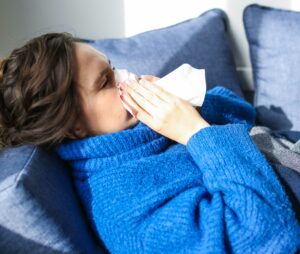Contents
Unmasking Adult-Onset Allergies: The Sneaky Culprit Behind Your Sneezing
Allergies are often associated with childhood, yet they don’t discriminate against age. Adult-onset allergies are a reality, and they could be the reason behind your increasing bouts of sneezing and discomfort in your 20s and 30s. In this comprehensive guide, we delve into the causes, symptoms, and management techniques for adult-onset allergies.

A man coping with unexpected adult-onset allergies – a growing phenomenon.
Decoding Adult-Onset Allergies
Contrary to popular belief, allergies can strike at any age, including adulthood. These are termed adult-onset allergies. A 2019 study highlighted that about half of adults with food allergies actually developed them later in life. These allergies can commence in your early twenties and persist well into your later years. Triggers can range from pollen and dust to certain food items and more.
Understanding the Immune System and Allergies
At the heart of an allergic reaction is your body’s immune system. It’s a complex network of cells and proteins designed to defend against harmful substances. When the immune system encounters an allergen, it triggers an inflammatory response, leading to allergy symptoms. Understanding this process is crucial to understanding why we have allergic reactions and how to manage them.
In some individuals, the immune system mistakes harmless substances like pollen or certain foods as threats, leading to an overreaction. This is what we know as an allergy. The substances that trigger these reactions are known as allergens. The immune response to these allergens varies from person to person, which is why some people are more susceptible to allergies than others.
Unraveling the Causes of Adult-Onset Allergies
Researchers are yet to pinpoint the precise cause of adult-onset allergies, but several factors are believed to play a role:
- Family History: If allergies run in your family, you may be susceptible to developing them later in life.
- Hygiene Hypothesis: Growing up in an extremely clean environment with limited allergen exposure may increase the risk of allergies in adulthood.
- Climate Change: Higher pollen counts due to climate change have been linked to an increase in allergic reactions.
- Antibiotic Overuse: Over-reliance on antibiotics, particularly during childhood, may contribute to the onset of allergies by disturbing gut bacteria balance.
- Moving to a New Environment: Shifting to a new city or country exposes you to different allergens and could trigger allergies.
- Stress: Chronic stress may exacerbate existing allergies or trigger new ones.
Common Types of Adult-Onset Allergies
While allergies can be triggered by a wide variety of substances, some are more common in adults than others. These include food allergies, drug allergies, insect allergies, pet allergies, and seasonal allergies. Each of these presents its unique challenges and may require different approaches to management and treatment.
Food allergies, for instance, may require dietary modifications and avoidance of certain foods. Drug allergies might necessitate alternative medications. Seasonal allergies, on the other hand, might call for lifestyle adjustments to minimize exposure to allergens during specific times of the year.
Identifying Symptoms of Adult-Onset Allergies
Knowing the symptoms can help you identify if you’re dealing with adult-onset allergies. Common symptoms to look out for include:
- Respiratory Allergies: Sneezing, a runny or stuffy nose, itchy or watery eyes.
- Food Allergies: Itching or swelling in the mouth, hives, stomach cramps, vomiting, diarrhea, and in severe cases, difficulty breathing or swallowing.
Managing and Preventing Adult-Onset Allergies
Despite the annoyance, there are effective ways to manage and prevent adult-onset allergies.
- Avoid Allergens: Stay indoors during high pollen counts, keep your environment clean, and minimize exposure to pet dander.
- Read Food Labels: If food allergies are the problem, pay close attention to food labels.
The Impact of Allergies on Quality of Life
Allergies can significantly impact an individual’s quality of life, affecting their daily activities, sleep, and overall well-being. While some people may experience mild symptoms, others may have severe reactions that can be life-threatening, such as anaphylactic shock. A 2019 study reported that of the adults with food allergies, more than a third had severe allergic reactions, with adults making up over 60% of the reported cases [5]. This highlights the importance of understanding, managing, and preventing adult-onset allergies.

A woman experiencing the discomfort of adult-onset allergies – a condition more common than we think.
Allergies and Mental Health
It’s important to note that the impact of allergies extends beyond physical symptoms. Numerous studies have shown a link between chronic allergies and mental health issues like anxiety and depression. The constant stress of managing allergy symptoms, coupled with physical discomfort, can take a toll on a person’s mental well-being.
Seeking support for mental health issues associated with allergies is just as important as treating the physical symptoms. If you’re feeling overwhelmed by your allergies, consider talking to a mental health professional. They can provide you with tools and strategies to cope with the emotional impact of living with allergies.
Diagnosis of Adult-Onset Allergies
Diagnosing adult-onset allergies involves identifying the specific allergens causing your symptoms. This usually starts with a detailed medical history and may include skin tests or blood tests to confirm the presence of allergen-specific antibodies. If you suspect you have adult-onset allergies, consider speaking to a healthcare provider for an accurate diagnosis.
Treatment Options for Adult-Onset Allergies
Treatment for adult-onset allergies is primarily aimed at relieving symptoms and preventing future allergic reactions. This often involves a combination of avoidance measures, medication, and in some cases, immunotherapy.
Over-the-counter and prescription medications can help manage allergy symptoms. These may include antihistamines, decongestants, corticosteroids, and other medications depending on the severity of your symptoms.
Immunotherapy, or allergy shots, might be recommended for individuals who don’t respond well to medications or who have severe symptoms. This treatment involves regular injections of small amounts of the allergen to help your immune system become less reactive over time.
The Role of Lifestyle in Managing Allergies
Lifestyle modifications can play a significant role in managing adult-onset allergies. Stress management, for instance, can help as chronic stress may exacerbate allergies. Practices such as regular exercise, meditation, and mindfulness techniques can help manage stress and potentially lessen allergy symptoms.
Diet is another important aspect. Certain foods can help reduce inflammation in the body, potentially helping to lessen allergic reactions. A balanced diet rich in fruits, vegetables, lean proteins, and healthy fats is recommended for overall health and can also support immune function.
Importance of Regular Check-ups and Allergy Testing
Regular medical check-ups and allergy testing are important for people with adult-onset allergies. Regular check-ups can help you stay on top of your health and monitor any changes in your allergy status. Allergy testing can identify specific allergens, helping you avoid triggers and tailor your treatment plan.
Allergy tests can be skin tests, blood tests, or elimination diets for food allergies. Your healthcare provider can guide you on the most appropriate testing method based on your symptoms and medical history.
Conclusion
Adult-onset allergies can be a real challenge, but with the right knowledge and tools, you can effectively manage them. Whether you’re just beginning to sneeze more frequently or dealing with severe reactions, understanding the causes, symptoms, and treatment options is the first step towards managing your allergies effectively.
Remember, if you’re struggling with allergies, don’t hesitate to seek medical help. Your healthcare provider can provide personalized advice and treatment options to help you navigate through this journey. Stay informed, take proactive measures, and here’s to a healthier, sneeze-free future!
References and Further Reading
For further information on adult-onset allergies, the following resources can be helpful:
- AAAAI (American Academy of Allergy Asthma & Immunology). “Allergies.”
- Mayo Clinic “Allergies – Symptoms and Causes”
Disclaimer: This article is for informational purposes only and should not replace professional medical advice. Always consult with a qualified healthcare provider regarding any medical concerns or questions.

